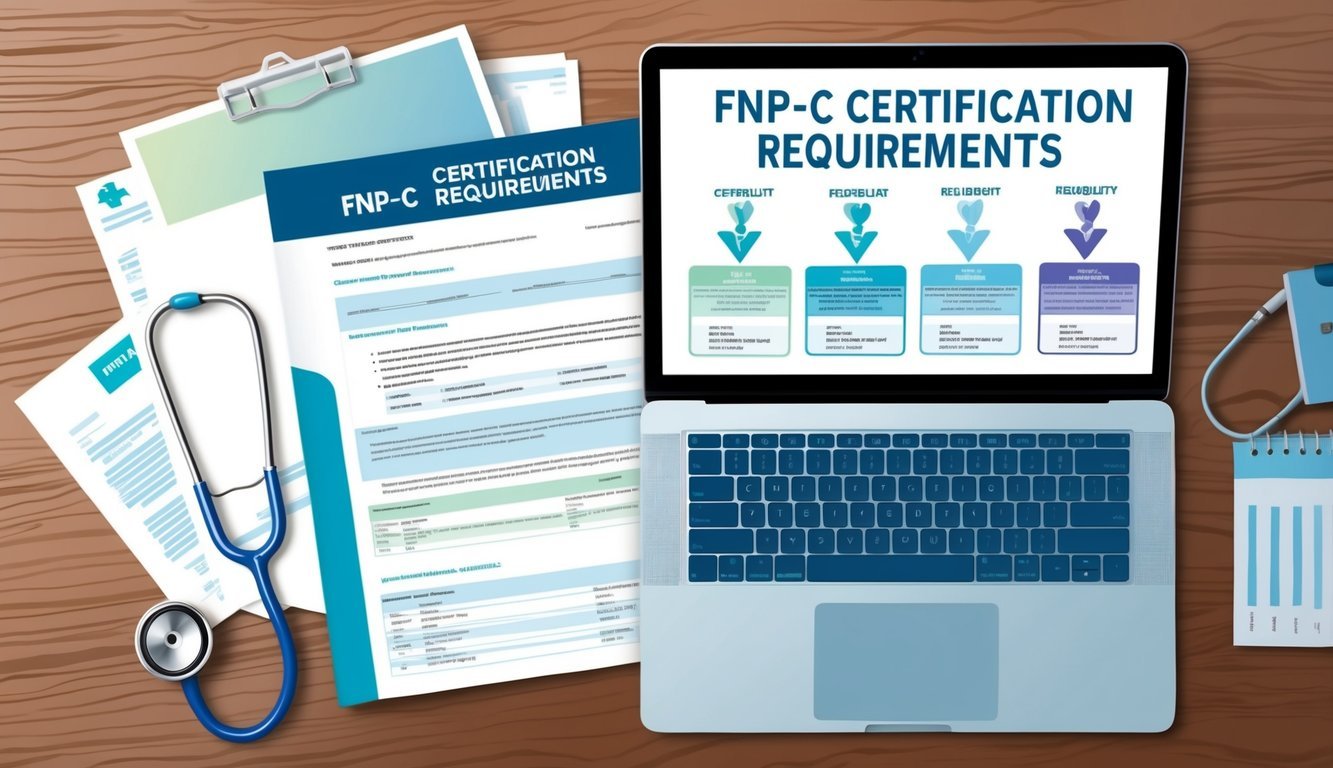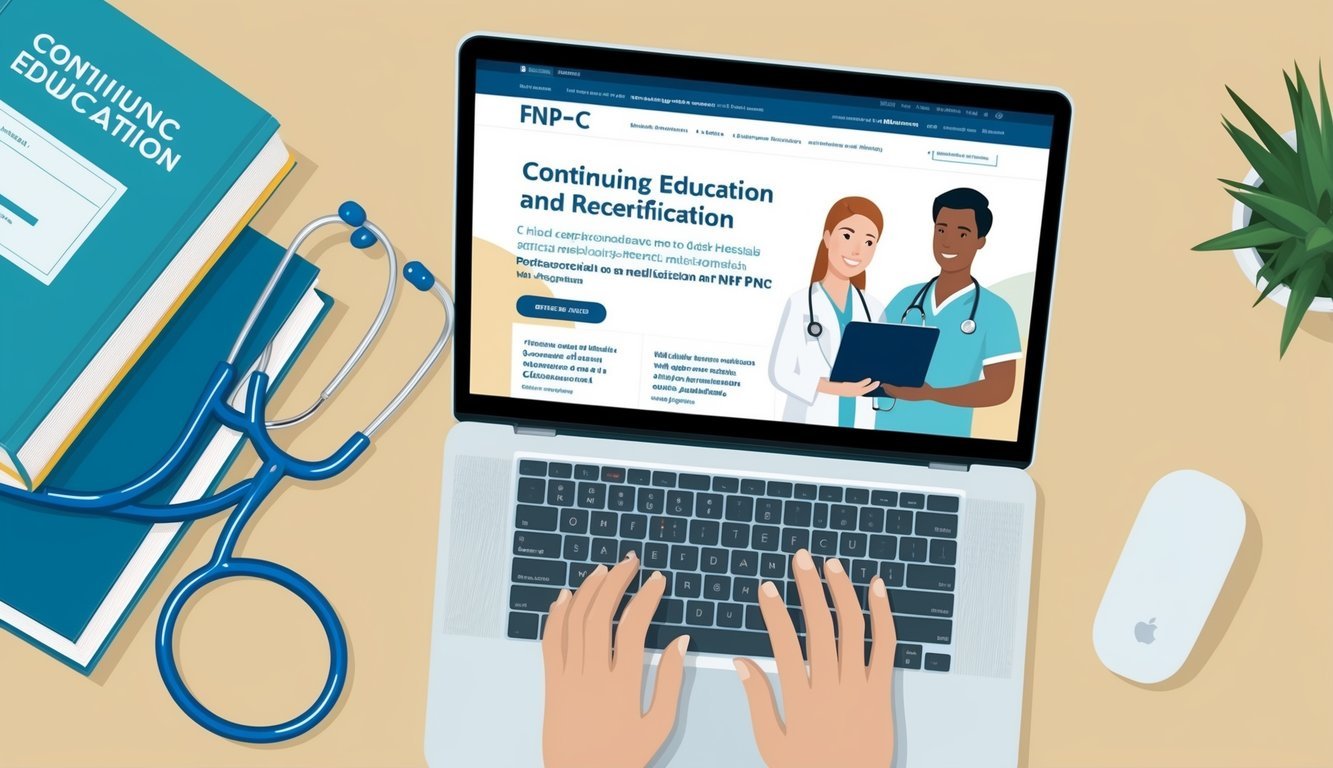As a family nurse practitioner (FNP), obtaining the FNP-C certification can significantly enhance your career opportunities and professional credibility.
The American Academy of Nurse Practitioners Certification Board (AANPCB) offers this certification.
It verifies your competence in providing comprehensive healthcare across the lifespan, making you a vital resource in any clinical setting.
To pursue the FNP-C certification, you must meet specific eligibility requirements.
These typically include holding a master’s degree in nursing and completing an accredited FNP program.
Once you meet these criteria, you’ll need to pass a rigorous exam that assesses your knowledge and skills in family-focused care.
Understanding the certification process and its advantages can help you take the next steps in your nursing career.
The FNP-C designation not only opens doors to various employment opportunities but also enables you to provide quality healthcare to diverse populations.
As you consider your options, it’s essential to explore the differences between certifications, such as FNP-C and FNP-BC, which can impact your career path.
For a detailed comparison of these certifications, you can visit this helpful resource.
Requirements and Eligibility for FNP Certification

To achieve FNP certification, you need to meet specific educational and professional criteria.
These requirements ensure that you possess the necessary knowledge and skills to provide high-quality care as a Family Nurse Practitioner.
Educational Standards
Your educational journey must include a master’s or doctoral degree in nursing from an accredited institution.
Programs should include foundational courses in nursing theory and advanced practice.
It’s vital that your program is accredited by recognized bodies such as the Accreditation Commission for Education in Nursing (ACEN) or the Commission on Collegiate Nursing Education (CCNE).
Additionally, your curriculum must cover essential topics, including APRN core courses, pharmacology, health assessment, and pathophysiology.
This comprehensive education equips you with the essential skills to function effectively as an FNP.
Clinical Experience
Along with your educational background, you need substantial clinical experience.
Most certification boards, including the American Academy of Nurse Practitioners (AANP) and the American Nurses Credentialing Center (ANCC), require you to complete a minimum of 500 clinical hours under a qualified preceptor.
This hands-on experience is vital for developing practical skills across various settings, allowing you to treat patients of all ages and conditions.
Documenting your clinical hours is crucial, as it demonstrates your readiness for the certification exam.
Be sure to gather all necessary documentation from your clinical practice to support your application.
Licensing Prerequisites
Before you can apply for FNP certification, you must hold a valid RN license in your state.
Check if your state has additional licensing requirements.
Holding an active RN license signifies that you have met the foundational nursing competencies required for advanced practice roles.
Once you meet the educational and clinical experience criteria, you can proceed to apply for certification through the AANP or the ANCC, depending on your preference.
Each organization has its own application process and examination structure, so familiarize yourself with their requirements to ensure a smooth certification experience.
Examination Content and Preparation
Preparing for the FNP-C exam involves understanding the specific knowledge domains covered and utilizing effective study resources and strategies.
This ensures you are well-equipped for the certification challenges ahead.
Knowledge Domains
The FNP-C exam assesses a wide range of knowledge domains critical for nurse practitioners.
Key areas include:
| Domain | Description |
|---|---|
| Anatomy and Physiology | Understanding body structures and functions is fundamental. |
| Pathophysiology | You must grasp disease processes and their implications for patient care. |
| Pharmacology | Knowledge of medications, their mechanisms, and side effects is crucial. |
| Patient Care | Ability to provide safe and effective interventions across various age groups. |
| Health Assessment | Skills in conducting thorough assessments are essential for diagnosis. |
The exam consists of 150 questions, of which 135 are scored, focusing on clinical knowledge applicable to patient care scenarios across different ages.
Study Resources and Strategies
Effective study resources can significantly improve your preparation for the FNP-C exam.
Recommended strategies include:
- Practice Questions: Utilize practice tests to familiarize yourself with the exam format. These tests cover entry-level competencies and help identify areas needing improvement.
- Textbooks and Guides: Consider comprehensive study materials like Kaplan’s FNP test prep, which includes over 800 practice questions and study strategies.
- Study Groups: Join study groups for shared resources and discussion on challenging topics.
- Time Management: Create a study schedule that allocates ample time for each content area, ensuring thorough preparation.
Combining these resources with disciplined study habits will enhance your readiness for the FNP-C examination.
Practice and Competency Standards

Your practice as a Family Nurse Practitioner-Certified (FNP-C) hinges on established standards that ensure safe and effective patient care.
This involves understanding your scope of practice, mastering clinical competencies, and applying evidence-informed practices in your daily routines.
Scope of Practice
The scope of practice for an FNP-C is defined by national and state regulations.
This includes performing evaluations, diagnosing health conditions, and developing treatment plans tailored to individual patients.
You are authorized to conduct comprehensive assessments that encompass:
- Health history: Gathering detailed medical, social, and family histories.
- Diagnostic procedures: Ordering and interpreting tests based on patient needs.
State laws often dictate specific procedures you may perform, which can vary widely.
It’s essential to familiarize yourself with your local regulations to ensure compliance and provide quality care.
More information can be found at AANP.
Clinical Competencies
As an FNP-C, your clinical competencies encompass a variety of skills required to deliver high-quality patient care.
Key competencies include:
- Patient assessment: Utilizing a systematic approach to gather information through physical examinations and diagnostic tests.
- Diagnosis: Identifying health problems based on your assessments.
- Treatment planning: Developing individualized care plans that align with evidence-based guidelines.
These competencies are rooted in a solid foundation of knowledge in pathophysiology, pharmacology, and health promotion strategies.
Adhering to the Core Competencies for Nurse Practitioners will help you maintain best practices.
Evidence-Informed Practice
Evidence-informed practice is crucial for delivering effective and relevant care.
This approach integrates the best available research with your clinical expertise and patient preferences.
Steps to implement evidence-informed practice include:
- Identifying clinical questions: Focus on patient-centered issues.
- Searching for evidence: Utilize databases and journals for current research relevant to your question.
- Evaluating the evidence: Assess its validity and applicability.
- Implementing findings: Apply the best evidence in your practice while considering the patient’s context.
To enhance your skills in evidence-informed practices, resources such as the AACN essentials can provide valuable insights.
Continuing Education and Recertification

Maintaining your Family Nurse Practitioner certification requires a commitment to ongoing education and meeting specific renewal requirements.
Understanding these aspects is essential to ensure you meet the necessary standards for recertification.
Educational Requirements
To maintain your certification, you must complete a minimum of 100 contact hours of continuing education (CE).
Of these, at least 25 hours should focus on advanced pharmacology.
This education should be relevant to your area of certification and aim to enhance your clinical competency.
You can fulfill these hours through various methods, including:
- Conferences: Attending nursing conferences can provide valuable learning experiences.
- Online Courses: Many organizations offer CE courses that you can complete at your convenience.
- Workshops: Hands-on workshops can be beneficial for practical skill enhancement.
Explore AANP CE Opportunities for resources tailored to your needs.
Certification Maintenance
Recertification occurs every five years and requires more than just CE hours.
During this timeframe, you must also document at least 1,000 practice hours in your focus area.
This clinical experience ensures you remain competent in your skills as a nurse practitioner.
When applying for recertification, you’ll need to provide proof of your CE credits and practice hours.
Completing a competency-based exam may also be required, depending on your certification pathway.
This process verifies that you have maintained the necessary knowledge and skills.
Ensure you stay on top of the AANPCB guidelines for detailed requirements to keep your certification current.
Career Opportunities and Professional Development

Exploring career opportunities as a Family Nurse Practitioner-Certified (FNP-C) involves examining various employment settings, advancement prospects, and compensation packages.
Understanding these aspects is essential for planning and achieving your professional goals in this field.
Employment Settings
As an FNP-C, you can find employment in diverse settings.
Common workplaces include:
- Primary Care Clinics: These are often the first point of contact for patients.
- Hospitals: You may work in outpatient departments and specialized units.
- Urgent Care Centers: These facilities cater to non-life-threatening emergencies, allowing flexibility in your schedule.
- Community Health Organizations: Here, you can provide care to underserved populations.
Each setting offers unique challenges and benefits, allowing you to tailor your career to your preferences and lifestyle.
Many employers prefer FNP-C candidates with additional nursing certifications to enhance their skills and patient care capabilities.
Advancement Prospects
Advancement opportunities for FNP-Cs are significant.
You can pursue various paths, including:
- Specialization: Consider focusing on specific areas such as pediatrics, geriatrics, or mental health.
- Leadership Roles: Positions like Nurse Manager or Director of Nursing offer a chance to lead teams.
- Education and Training: Becoming a nurse educator can enable you to shape future generations of nurses.
Additionally, engaging in lifelong learning through professional development helps you stay competitive.
Certification programs, workshops, and conferences can support your career goals and align with employer preferences for advanced skills.
Salary and Benefits
FNP-Cs have a robust earning potential.
Recent estimates show that family nurse practitioners make around $115,000 annually.
Here’s a brief overview:
| Position | Average Salary |
|---|---|
| Family Nurse Practitioner | $115,000 |
| Emergency Nurse Practitioner | $135,453 |
Many employers offer competitive salaries and benefits.
These benefits can include health insurance, retirement plans, and paid time off.
Some employers also offer productivity bonuses.
Focusing on maximizing your skills through certifications and specialization can increase your marketability and earning potential in the field.

